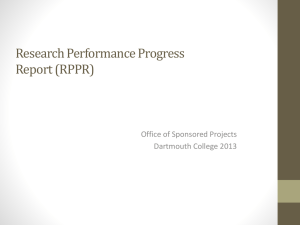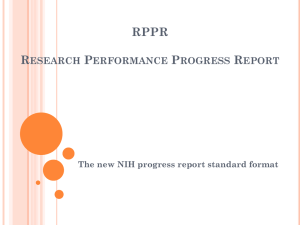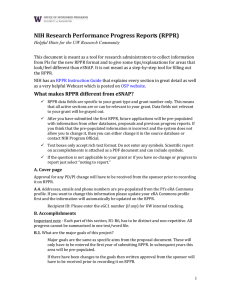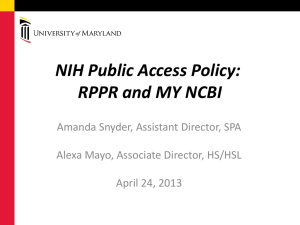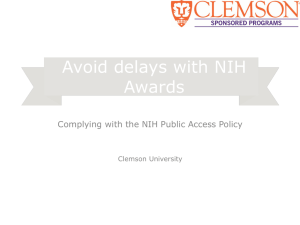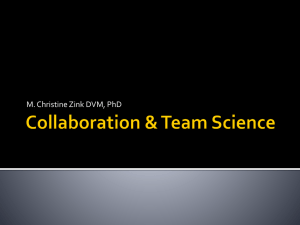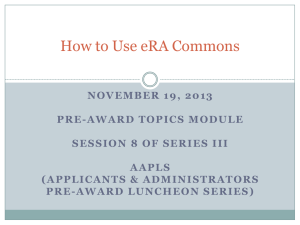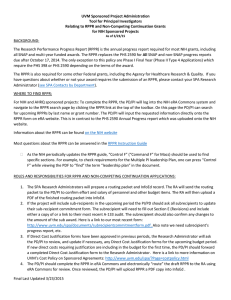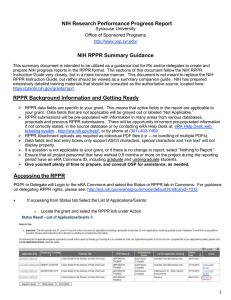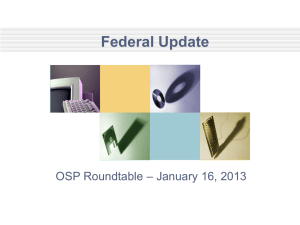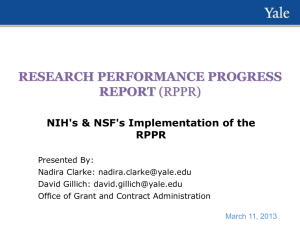Research Performance Progress Reporting
advertisement
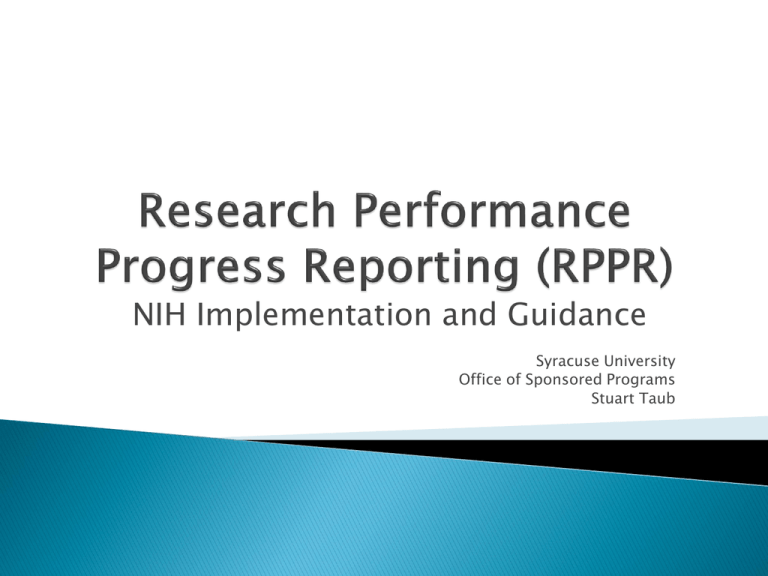
NIH Implementation and Guidance Syracuse University Office of Sponsored Programs Stuart Taub RPPR: Research Performance Progress Report is an initiative among federal agencies to introduce greater consistency for interim progress reporting, and to reduce administrative burden. NIH RPPR process replaces eSNAP: electronic Streamlined Non-Competing Award Process. NIH RPPR is required for all awards issued under the SNAP process, and all fellowship awards, with budget start dates on or after July 1, 2013. Non-SNAP awards targeted for October 2014, but final guidance not yet issued. RPPR contain the following categories of information: ◦ Standard Cover Page ◦ Mandatory Component (Accomplishments) ◦ Optional Components (Agency Specific) Each Agency will utilize standard instructions developed for each category, but may also provide additional program-specific instructions necessary to clarify requirement for a particular program Follow agency specific guidance closely (one size does not fit all !) Describe progress, study results, the significance of the findings, and any significant changes. Information is pre-populated from NIH Systems: ◦ ◦ ◦ ◦ ◦ PD/PI Information Grant Number Project title and period Performance Sites Personnel Due 45 days prior to budget start date for SNAP, and 60 days prior for Fellowships MyNCBI publications list displayed Detailed budget not required NIH policy requirements requested (agency specific components) Separate screens for reporting components Uses checkbox, text box, PDF, or selecting “Nothing to Report” Required information for all foreign collaborations Effort rounded to nearest whole person month Key Personnel: 0.0 - 0.4 months, enter 0 month effort Key Personnel: 0.5 - 0.9 months, enter 1 month effort Required section for competitive revisions/ admin. supplements associated with the award Public Access compliance status displayed Other support required only if changed from prior reports Link to Notice of Award Streamlined ClinicalTrials.gov reporting information The RPPR has separate screens for each of the following reporting components: ◦ ◦ ◦ ◦ ◦ ◦ ◦ ◦ Cover Page Accomplishments Products Participants Impact Changes Special NIH Reporting Requirements Budget – Not Required for SNAP awards, but will be required for non-SNAP RPPR text boxes do not support special characters or symbols PDF format must be used for uploads and cannot ‘bundle’ various sections; must be separate uploads RPPR is only for interim progress reports, not the final Remember to click SAVE button prior to leaving any screen, system does not autosave Publications must be entered through MyNCBI, which will then filter to the RPPR Progress Report Additional Materials (PRAM) is required if non-complaint publications are contained in the RPPR. Progress Report Additional Materials (PRAM): Electronic mechanism for NIH to request more information in connection with a progress report. Currently being utilized to correct for “non-compliant” publications. Allows SU to respond to such requests (PI, SO). All investigators should be aware of the NIH Public Access Policy to avoid PRAM requests and/or delays to funding because of “non-compliant” publications: http://publicaccess.nih.gov/ PIs/PDs need to prompt their graduate students and undergraduate students to create eRA Commons Logins now. Phased in implementation - RPPR warnings effective beginning 10/18/2013; Required with RPPR submissions October 2014. …additional information NOT-OD-13-097. Individual Development Plans (IDPs) for all Graduate Students and Postdoc Researchers supported by NIH. IDPs will help these individuals achieve career goals within the biomedical research workforce. Institutions will be strongly encouraged to develop IDPs and report on these for such individuals reported as “Participants” on the RPPR beginning October 2014. See NOT-OD-13-093 Please look for OSP’s newly created RPPR Summary Guidance tool, Coming Soon! NIH RPPR Page • http://grants.nih.gov/grants/rppr/index.htm NIH RPPR Instruction Guide http://grants.nih.gov/grants/rppr/rppr_instruction_guide.pdf NIH RPPR Webinar • https://grants.nih.gov/grants/webinar_docs/webinar_20121017.mp4
